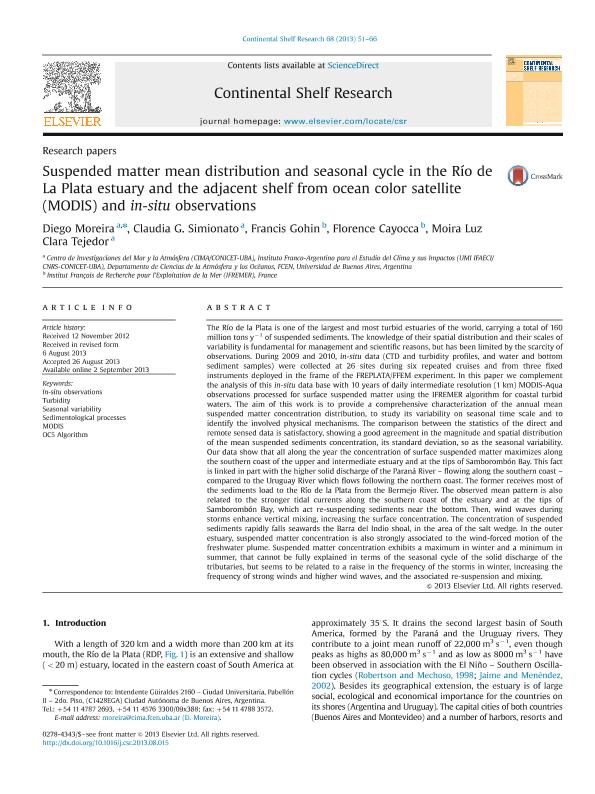Mostrar el registro sencillo del ítem
dc.contributor.author
Moreira, Diego

dc.contributor.author
Simionato, Claudia Gloria

dc.contributor.author
Gohin, Francis
dc.contributor.author
Cayocca, Florence
dc.contributor.author
Luz Clara Tejedor, Moira

dc.date.available
2019-10-02T21:42:17Z
dc.date.issued
2013-10
dc.identifier.citation
Moreira, Diego; Simionato, Claudia Gloria; Gohin, Francis; Cayocca, Florence; Luz Clara Tejedor, Moira; Suspended matter mean distribution and seasonal cycle in the Río de La Plata estuary and the adjacent shelf from ocean color satellite (MODIS) and in-situ observations; Pergamon-Elsevier Science Ltd; Continental Shelf Research; 68; 10-2013; 51-66
dc.identifier.issn
0278-4343
dc.identifier.uri
http://hdl.handle.net/11336/85098
dc.description.abstract
The Río de la Plata is one of the largest and most turbid estuaries of the world, carrying a total of 160 million tonsy-1 of suspended sediments. The knowledge of their spatial distribution and their scales of variability is fundamental for management and scientific reasons, but has been limited by the scarcity of observations. During 2009 and 2010, in-situ data (CTD and turbidity profiles, and water and bottom sediment samples) were collected at 26 sites during six repeated cruises and from three fixed instruments deployed in the frame of the FREPLATA/FFEM experiment. In this paper we complement the analysis of this in-situ data base with 10 years of daily intermediate resolution (1km) MODIS-Aqua observations processed for surface suspended matter using the IFREMER algorithm for coastal turbid waters. The aim of this work is to provide a comprehensive characterization of the annual mean suspended matter concentration distribution, to study its variability on seasonal time scale and to identify the involved physical mechanisms. The comparison between the statistics of the direct and remote sensed data is satisfactory, showing a good agreement in the magnitude and spatial distribution of the mean suspended sediments concentration, its standard deviation, so as the seasonal variability. Our data show that all along the year the concentration of surface suspended matter maximizes along the southern coast of the upper and intermediate estuary and at the tips of Samborombón Bay. This fact is linked in part with the higher solid discharge of the Paraná River - flowing along the southern coast - compared to the Uruguay River which flows following the northern coast. The former receives most of the sediments load to the Río de la Plata from the Bermejo River. The observed mean pattern is also related to the stronger tidal currents along the southern coast of the estuary and at the tips of Samborombón Bay, which act re-suspending sediments near the bottom. Then, wind waves during storms enhance vertical mixing, increasing the surface concentration. The concentration of suspended sediments rapidly falls seawards the Barra del Indio shoal, in the area of the salt wedge. In the outer estuary, suspended matter concentration is also strongly associated to the wind-forced motion of the freshwater plume. Suspended matter concentration exhibits a maximum in winter and a minimum in summer, that cannot be fully explained in terms of the seasonal cycle of the solid discharge of the tributaries, but seems to be related to a raise in the frequency of the storms in winter, increasing the frequency of strong winds and higher wind waves, and the associated re-suspension and mixing.
dc.format
application/pdf
dc.language.iso
eng
dc.publisher
Pergamon-Elsevier Science Ltd

dc.rights
info:eu-repo/semantics/openAccess
dc.rights.uri
https://creativecommons.org/licenses/by-nc-nd/2.5/ar/
dc.subject
IN-SITU OBSERVATIONS
dc.subject
MODIS
dc.subject
OC5 ALGORITHM
dc.subject
SEASONAL VARIABILITY
dc.subject
SEDIMENTOLOGICAL PROCESSES
dc.subject
TURBIDITY
dc.subject.classification
Oceanografía, Hidrología, Recursos Hídricos

dc.subject.classification
Ciencias de la Tierra y relacionadas con el Medio Ambiente

dc.subject.classification
CIENCIAS NATURALES Y EXACTAS

dc.title
Suspended matter mean distribution and seasonal cycle in the Río de La Plata estuary and the adjacent shelf from ocean color satellite (MODIS) and in-situ observations
dc.type
info:eu-repo/semantics/article
dc.type
info:ar-repo/semantics/artículo
dc.type
info:eu-repo/semantics/publishedVersion
dc.date.updated
2019-10-02T20:53:36Z
dc.journal.volume
68
dc.journal.pagination
51-66
dc.journal.pais
Países Bajos

dc.journal.ciudad
Amsterdam
dc.description.fil
Fil: Moreira, Diego. Consejo Nacional de Investigaciones Científicas y Técnicas. Oficina de Coordinación Administrativa Ciudad Universitaria. Centro de Investigaciones del Mar y la Atmósfera. Universidad de Buenos Aires. Facultad de Ciencias Exactas y Naturales. Centro de Investigaciones del Mar y la Atmósfera; Argentina
dc.description.fil
Fil: Simionato, Claudia Gloria. Consejo Nacional de Investigaciones Científicas y Técnicas. Oficina de Coordinación Administrativa Ciudad Universitaria. Centro de Investigaciones del Mar y la Atmósfera. Universidad de Buenos Aires. Facultad de Ciencias Exactas y Naturales. Centro de Investigaciones del Mar y la Atmósfera; Argentina
dc.description.fil
Fil: Gohin, Francis. Institut Français de Recherche pour l’Exploitation de la Mer; Francia
dc.description.fil
Fil: Cayocca, Florence. Institut Français de Recherche pour l’Exploitation de la Mer; Francia
dc.description.fil
Fil: Luz Clara Tejedor, Moira. Consejo Nacional de Investigaciones Científicas y Técnicas. Oficina de Coordinación Administrativa Ciudad Universitaria. Centro de Investigaciones del Mar y la Atmósfera. Universidad de Buenos Aires. Facultad de Ciencias Exactas y Naturales. Centro de Investigaciones del Mar y la Atmósfera; Argentina
dc.journal.title
Continental Shelf Research

dc.relation.alternativeid
info:eu-repo/semantics/altIdentifier/url/http://www.sciencedirect.com/science/article/pii/S0278434313002835
dc.relation.alternativeid
info:eu-repo/semantics/altIdentifier/doi/http://dx.doi.org/10.1016/j.csr.2013.08.015
Archivos asociados
